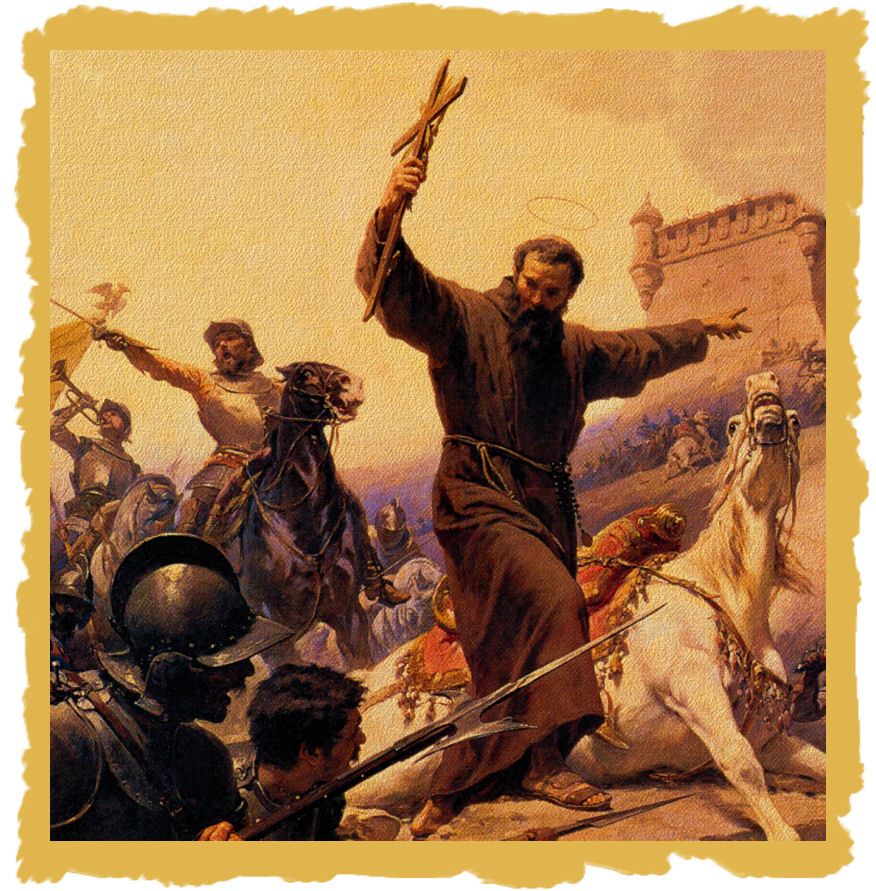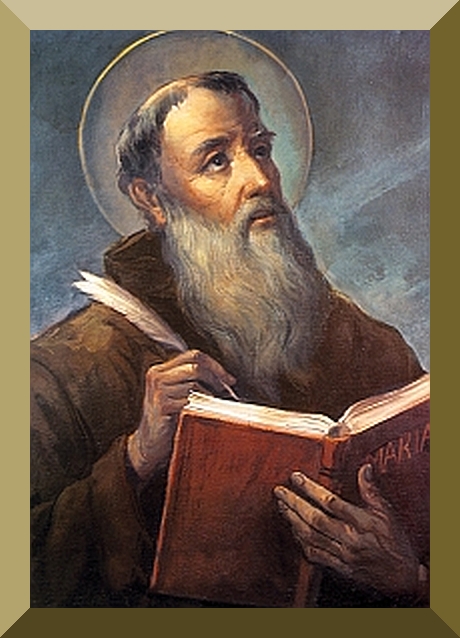At first glance perhaps the most remarkable quality of Lawrence of Brindisi is his outstanding gift of languages. In addition to a thorough knowledge of his native Italian, he had complete reading and speaking ability in Latin, Hebrew, Greek, German, Bohemian, Spanish and French.
He was born on July 22, 1559, and died exactly 60 years later on his birthday in 1619. His parents William and Elizabeth Russo gave him the name of Julius Caesar, Caesare in Italian. After the early death of his parents, he was educated by his uncle at the College of St. Mark in Venice.
When he was just 16 he entered the Capuchin Franciscan Order in Venice and received the name of Lawrence. He completed his studies of philosophy and theology at the University of Padua and was ordained a priest at 23.
With his facility for languages he was able to study the Bible in its original texts. At the request of Pope Clement VIII, he spent much time preaching to the Jews in Italy. So excellent was his knowledge of Hebrew, the rabbis felt sure he was a Jew who had become a Christian.
In 1956 the Capuchins completed a 15-volume edition of his writings. Eleven of these 15 contain his sermons, each of which relies chiefly on scriptural quotations to illustrate his teaching.
Lawrence’s sensitivity to the needs of people—a character trait perhaps unexpected in such a talented scholar—began to surface. He was elected major superior of the Capuchin Franciscan province of Tuscany at the age of 31. He had the combination of brilliance, human compassion and administrative skill needed to carry out his duties. In rapid succession he was promoted by his fellow Capuchins and was elected minister general of the Capuchins in 1602. In this position he was responsible for great growth and geographical expansion of the Order.
Lawrence was appointed papal emissary and peacemaker, a job which took him to a number of foreign countries. An effort to achieve peace in his native kingdom of Naples took him on a journey to Lisbon to visit the king of Spain. Serious illness in Lisbon took his life in 1619. His constant devotion to Scripture, coupled with great sensitivity to the needs of people, present a lifestyle which appeals to Christians today. Lawrence had a balance in his life that blended self-discipline with a keen appreciation for the needs of those whom he was called to serve.
VATICAN CITY, 23 MAR 2011 – In his general audience this morning, Benedict XVI dedicated his catechesis to St. Lawrence of Brindisi (born Giulio Cesare Rossi, 1559-1619), a Doctor of the Church.
As a theologian and expert in Sacred Scripture and the Church Fathers, Lawrence of Brindisi was an exemplary teacher of Catholic doctrine among those Christians who, especially in Germany, had adhered to the Reformation.
“With his clear and tranquil explanations he demonstrated the biblical and patristic foundation of all the articles of faith called into question by Martin Luther, among them the primacy of St. Peter and his Successors, the divine origin of the episcopate, justification as interior transformation of man, and the necessity of good works for salvation. The success enjoyed by St. Lawrence helps us to understand that even today, as the hope-filled journey of ecumenical dialogue continues, the reference to Sacred Scripture, read in the Tradition of the Church, is an indispensable element of fundamental importance”.
“Even the lowliest members of the faithful who did not possess vast culture drew advantage from the convincing words of St. Lawrence, who addressed the humble in order to call everyone to live a life coherent with the faith they professed”, said the Holy Father. “This was a great merit of the Capuchins and of the other religious orders which, in the sixteenth and seventeenth centuries, contributed to the renewal of Christian life. … Even today, the new evangelization needs well-trained, zealous and courageous apostles, so that the light and beauty of the Gospel may prevail over the cultural trends of ethical relativism and religious indifference, transforming the various ways people think and act in an authentic Christian humanism”.
Lawrence was a professor of theology, master of novices, minister provincial and minister general of the Capuchin Order, but amidst all these tasks “he also cultivated an exceptionally active spiritual life”, the Pope said. In this context he noted how all priests “can avoid the danger of activism – that is, of acting while forgetting the profound motivations of their ministry – only if they pay heed to their own inner lives”.
The Holy Father then turned his attention to another aspect of the saint’s activities: his work in favour of peace. “Supreme Pontiffs and Catholic princes repeatedly entrusted him with important diplomatic missions to placate controversies and favour harmony between European States, which at the time were threatened by the Ottoman Empire. Today, as in St. Lawrence’s time, the world has great need of peace, it needs peace-loving and peace-building men and women. Everyone who believes in God must always be a source of peace and work for peace”, he said.
Lawrence of Brindisi was canonised in 1881 and declared a Doctor of the Church by Blessed John XXIII in 1959 in recognition of his many works of biblical exegesis and Mariology. In his writings, Lawrence “also highlighted the action of the Holy Spirit in the lives of believers”, the Pope said.
“St. Lawrence of Brindisi”, he concluded, “teaches us to love Sacred Scripture, to become increasingly familiar with it, daily to cultivate our relationship with the Lord in prayer, so that our every action, our every activity, finds its beginning and its fulfillment in Him”.
“God is love, and all His operations proceed from love. Once He wills to manifest that goodness by sharing His love outside Himself, then the Incarnation becomes the supreme manifestation of His goodness and love and glory. So, Christ was intended before all other creatures and for His own sake. For Him all things were created and to Him all things must be subject, and God loves all creatures in and because of Christ. Christ is the first-born of every creature, and the whole of humanity as well as the created world finds its foundation and meaning in Him. Moreover, this would have been the case even if Adam had not sinned” –St. Lawrence of Brindisi
“The Holy Spirit”, St Lawrence wrote, “sweetens the yoke of the divine law and lightens its weight, so that we may observe God’s commandments with the greatest of ease and even with pleasure”.
“The word of the Lord”, he said, “is a light for the mind and a fire for the will, so that man may know and love God. For the inner man, who lives through the living grace of God’s Spirit, it is bread and water, but bread sweeter than honey and water better than wine or milk…. It is a weapon against a heart stubbornly entrenched in vice. It is a sword against the flesh, the world and the devil, to destroy every sin”.
“My dear souls, let us recognize, I pray you, Christ’s infinite charity towards us in the institution of this Sacrament of the Eucharist. In order that our love be a spiritual love, He wills a new heart, a new love, a new spirit for us. It is not with a carnal heart, but with a spiritual one, that Christ has loved us with a gratuitous love, a supreme and most ardent love, by way of pure grace and charity. Ah! One needs to love him back with one’s whole, whole, whole, living, living, living and true, true, true heart!!” – Saint Lawrence of Brindisi
Love,
Matthew


